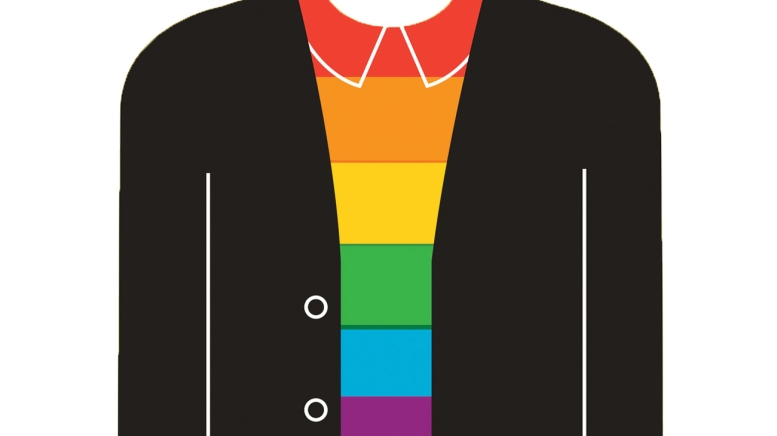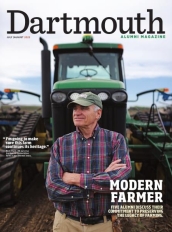Dartmouth’s LGBTQIA+ alumni association, originally the Dartmouth Gay and Lesbian Alumni Association (DGALA), has come a long way in four decades. We began with a double-digit mailing list cobbled together through word of mouth. Now we’re officially recognized by the College, represented on the Alumni Council, and holding an all-class reunion this July to celebrate our 40th anniversary.
This recognition is “really shocking in a good way,” says Erik Ochsner ’93, president of DGALA’s board of directors. “Dartmouth is buying rainbow tablecloths and balloons and all sorts of stuff to say, ‘Hey, welcome back! You’re part of the Dartmouth family!’ ” DGALA has made many members feel they belong in the Dartmouth family for the first time. It’s a big shift, says Chuck Edwards, Adv’86, an early leader of DGALA. He knows several alumni who refused to connect with Dartmouth because of negative undergraduate experiences related to their queer identities.
Others of us, while not estranged from the Dartmouth family, have a complicated relationship with it. The College is where I met my closest friends. Yet we became close, in the beginning, because they were the only other transgender students I knew, and I was not anything approaching cis-passing. To avoid feeling like a freak, I clung to the people I trusted not to treat me like one. Memories of my undergraduate years are bittersweet, and it’s difficult at times to describe myself as a Dartmouth alumnus. Even so, when asked to join DGALA’s board of directors, I felt I should step up.
Kris Gebhard ’09 was not planning to attend the reunion until recently, when they discovered they could do so with financial support from DGALA. They remember Dartmouth as “invigorating, challenging, enlightening,” a blend of high and low experiences. Gebhard says they faced “significant administrative challenges around housing or even things such as getting my correct name on email.” But they also felt affirmed by their peers, especially in Tabard, one of the few Greek houses that is not gender exclusive.
Guillermo Rojas Hernandez ’13 also found community in Tabard. “Being queer on campus was definitely a struggle,” he says. When he arrived at Dartmouth, Rojas Hernandez was among a “very small handful” of students who openly identified as lesbian. Later, when he decided to transition and began taking testosterone, he took a year off because he felt unsafe on campus in the “in-between stage.”
Melanie Popper ’99 remembers “quite a bit of homophobia” at Dartmouth, but the Dartmouth Rainbow Alliance was “well funded and supported and we had our events and parties and people came.” The African and Caribbean Students’ Organization (AfriCaSO) and the feminist publication Uncommon Threads were important spaces for Popper, as was the first Introduction to Gay and Lesbian Studies course, taught by profs Susan Ackerman ’80 and Annelise Orleck. “All of the LGBTQ kids took it,” she says, “and it really created a sense of community.”
Carving out a space for community in a hostile environment can sometimes be enough. But for all the progress American society has made on queer and trans issues, it is, as we’ve seen in the past few months, too easily reversed. And as the oppression of LGBTQIA+ people and our marginalized allies worsens, queer organizations such as DGALA must decide what, if anything, we can do about it.
DGALA is, at the end of the day, an alumni association. This year we will celebrate our anniversary with a reunion. But in some ways we differ from other reunioning alumni. President Trump and his party have vowed to “end the left-wing gender insanity” supposedly embodied by DGALA’s transgender members; they have not likewise pledged to “end” the class of 2010. One transgender alumna declined to be interviewed for this article out of fear of attracting negative attention.
Members of other affiliated alumni groups—representing Asian Pacific, Latino, Native American, Black, and female alumni—also have been political targets. Multiple DGALA members I spoke with emphasized that these groups should work together. Despite the current political environment, Ochsner is confident “Dartmouth has no intention of not honoring and supporting its affiliated groups,” he says.
“I do want to see DGALA standing up for trans students and queer students,” Rojas Hernandez says. Had he known he could ask DGALA for help as a student, he thinks he would have. Popper hopes we will advocate for more LGBTQIA+-centered courses that create the sort of community she experienced as a student.
In the early days of DGALA Edwards hosted envelope-stuffing parties to get out the newsletter to everyone on the rapidly growing mailing list. Eating pizza and stuffing envelopes together, Edwards says, was “therapy in a way.” He thinks DGALA can continue to provide something like this in the coming years: creativity, community, joy.
Val Werner is the coordinator of the Historical Accountability Student Research Program at Rauner Library.





